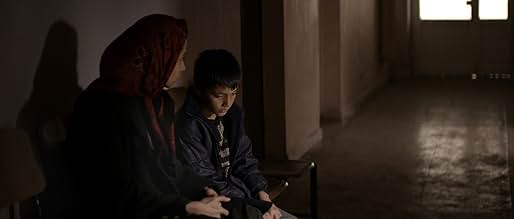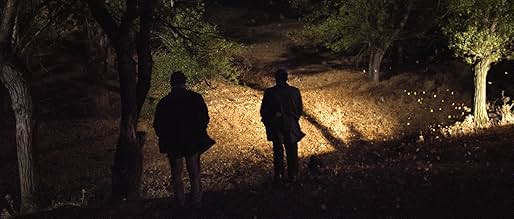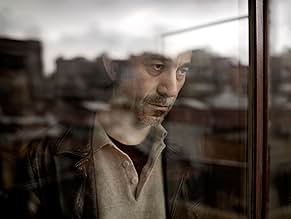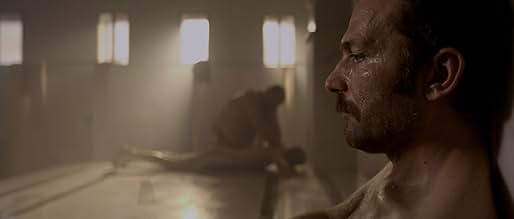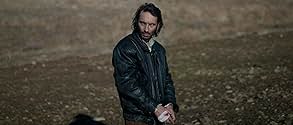AVALIAÇÃO DA IMDb
7,8/10
52 mil
SUA AVALIAÇÃO
Um grupo de homens partiu em busca de um cadáver na Anatólia.Um grupo de homens partiu em busca de um cadáver na Anatólia.Um grupo de homens partiu em busca de um cadáver na Anatólia.
- Direção
- Roteiristas
- Artistas
- Prêmios
- 21 vitórias e 34 indicações no total
- Direção
- Roteiristas
- Elenco e equipe completos
- Produção, bilheteria e muito mais no IMDbPro
Avaliações em destaque
A dark cold night over the Turkish steppes, an entourage of police detectives, a commissioner, a doctor, and two grim prisoners in tow search for a dead body for over 2 hours in the darkest part of the night. What appears to be a good setup for the latest police procedural, crime fiction, thriller, even midnight horror turns out unexpected intensely revealing character portraits, in a most exhaustive and surprisingly humorous way. Recreating his earlier slow burn meditations, yet with a new sense of maturity "Anatolia" is true to the real rhythms of night, the frustrations of waiting for the crucial evidence to appear, the vagueness of memory, remembrance of traumatic events in love and in murder and the bleakness of night of the eternal night and unwelcome truths revealed by the day.
One senses the tedium and frustration of the murder investigation, simultaneously the dread and anticipation of revealing the dead body in it's gory realism, the salacious details resulting in the murder itself and the public crucification of the culprits Anatolia however is almost an antithesis to the psychological revelations over the course of the night.
Before (and if) we reach the major discovery, the police officers and commissar reveal their aversions to murder, mortality, the search for a guilty suspect before the evidence is revealed, their cultural differences, assumptions about class differences, marriage, and human nature. Throughout the eternal stillness of night, poetic treatises about life, death and love are superimposed over cracks of thunder, howling winds and pattering rains, the harsh spotlight of car headlamps contrast with the comforting glow of a flickering lantern on a village porch.
The search is tedious and frustrating for both the officers and the audience, as much as the motives are unclear, like love, life, and marriage. The ambiguity of night is as unclear as the motives for murder, does daybreak reveal anything revelatory, and does the dissection of a murder case hours and days after its uncovering reveal any truth into it's motives or human nature itself?
The audience should be wiser against the small town working-class police task-force just following orders; they may empathise more with the reflective and sensitive Doctor Cemal or the cunning and charismatic Prosecutor Nusret, yet under the surface, their own personal lives in marriage and children are vexed, the investigation is almost a respite from these frustrations. The commissioner seems haunted by his ill wife, yet on the surface, this is treated as a running joke, later, it reveals thematic links to the search for answers in the unknown murder case. Similarly the doctor tries to make peace with his conscience about a past personal relationship. The impression of him is the most sensible, grounding the moral compass, yet his flaws are also revealed by daylight.
Contrasts between these characters and the murder suspect who appears (at least on the surface) to be more emotionally stable than many of the prosecutors is complex and kaleidoscopic. This is a remarkable introspective film ostensibly exploring a murder case and therefore guilt and conscience, yet further introspection reveals riffs on love story(ies), female roles, family, honour, class prejudice and the legal system.
Women appear seldom in the film, some wives are talked about yet, their effect on the men (and audience) is haunting, magnetic, and enigmatic. The small towns which they stop at along their road trip are barren, simple, country-like, impressing the sense of isolation both physically and more saliently, emotionally. The appearance of women and children in these towns is revelatory and thirst-quenching. Therefore a lot of time spent for introspection and meditation, watching how the characters reacting to the tedium, stress, fatigue and mortality of a long hard night.
The terrain of Anatolia is a foreboding character in itself with it's rolling fields illuminated by the sharp piercing car headlights slicing the night like snippets revealed about each character - yet the whole picture remains hidden. A storm is sensed coming both literally and figuratively, the expectant howling winds like ghosts of the dead and the memories of the characters across the unforeseeable terrain. The mood is incredibly poetic, rhythmically blending with the sounds of the whistling winds, the crunch of icy gravel, pattering of rain, and fluttering pigeons, all in the emptiness of night.
Nuri Bilge Ceylan's previous films have been sombre (frustrations) meditations on human nature, such as the brewing storm in 3 Monkeys, the solitude of cascading snow and the cracking waves of the harbour in Distant, to the scorching blistering summer in Climates; environment and mood work in integration in his work. In "Anatolia", the moods over the windy plains are as intense as the brewing moods in the characters.
The scenes of the cars rolling across the plains lit only by the headlights occupy the initial part of the film. They run almost in real time; with the wind whipping though grass and plains they form a stark, haunting and grim atmosphere. There are bravura haunting scenes like the rolling apple down the hill, whilst initially seemingly superfluous, yet curious it's implications to reveal characters' current moods and eventual outcomes. And the the colloquial dinner at the mayor house under the swaying candlelight, then in pitch darkness, the light revealing (literally) different shades of each character; they the revelation (apparition) of a miraculous figure moments later is spellbinding.
This is cinema with the highest respect for the audience, yet Ceylan has said that he wants to bore the audience, "because out of boredom might come a miracle - maybe days later, maybe years." Not sure whether to take this seriously however what it does demonstrate is a greater onus on viewer to think actively about the story and the consequences; out of deep reflection perhaps may come a revelation about the characters and ourselves.
One senses the tedium and frustration of the murder investigation, simultaneously the dread and anticipation of revealing the dead body in it's gory realism, the salacious details resulting in the murder itself and the public crucification of the culprits Anatolia however is almost an antithesis to the psychological revelations over the course of the night.
Before (and if) we reach the major discovery, the police officers and commissar reveal their aversions to murder, mortality, the search for a guilty suspect before the evidence is revealed, their cultural differences, assumptions about class differences, marriage, and human nature. Throughout the eternal stillness of night, poetic treatises about life, death and love are superimposed over cracks of thunder, howling winds and pattering rains, the harsh spotlight of car headlamps contrast with the comforting glow of a flickering lantern on a village porch.
The search is tedious and frustrating for both the officers and the audience, as much as the motives are unclear, like love, life, and marriage. The ambiguity of night is as unclear as the motives for murder, does daybreak reveal anything revelatory, and does the dissection of a murder case hours and days after its uncovering reveal any truth into it's motives or human nature itself?
The audience should be wiser against the small town working-class police task-force just following orders; they may empathise more with the reflective and sensitive Doctor Cemal or the cunning and charismatic Prosecutor Nusret, yet under the surface, their own personal lives in marriage and children are vexed, the investigation is almost a respite from these frustrations. The commissioner seems haunted by his ill wife, yet on the surface, this is treated as a running joke, later, it reveals thematic links to the search for answers in the unknown murder case. Similarly the doctor tries to make peace with his conscience about a past personal relationship. The impression of him is the most sensible, grounding the moral compass, yet his flaws are also revealed by daylight.
Contrasts between these characters and the murder suspect who appears (at least on the surface) to be more emotionally stable than many of the prosecutors is complex and kaleidoscopic. This is a remarkable introspective film ostensibly exploring a murder case and therefore guilt and conscience, yet further introspection reveals riffs on love story(ies), female roles, family, honour, class prejudice and the legal system.
Women appear seldom in the film, some wives are talked about yet, their effect on the men (and audience) is haunting, magnetic, and enigmatic. The small towns which they stop at along their road trip are barren, simple, country-like, impressing the sense of isolation both physically and more saliently, emotionally. The appearance of women and children in these towns is revelatory and thirst-quenching. Therefore a lot of time spent for introspection and meditation, watching how the characters reacting to the tedium, stress, fatigue and mortality of a long hard night.
The terrain of Anatolia is a foreboding character in itself with it's rolling fields illuminated by the sharp piercing car headlights slicing the night like snippets revealed about each character - yet the whole picture remains hidden. A storm is sensed coming both literally and figuratively, the expectant howling winds like ghosts of the dead and the memories of the characters across the unforeseeable terrain. The mood is incredibly poetic, rhythmically blending with the sounds of the whistling winds, the crunch of icy gravel, pattering of rain, and fluttering pigeons, all in the emptiness of night.
Nuri Bilge Ceylan's previous films have been sombre (frustrations) meditations on human nature, such as the brewing storm in 3 Monkeys, the solitude of cascading snow and the cracking waves of the harbour in Distant, to the scorching blistering summer in Climates; environment and mood work in integration in his work. In "Anatolia", the moods over the windy plains are as intense as the brewing moods in the characters.
The scenes of the cars rolling across the plains lit only by the headlights occupy the initial part of the film. They run almost in real time; with the wind whipping though grass and plains they form a stark, haunting and grim atmosphere. There are bravura haunting scenes like the rolling apple down the hill, whilst initially seemingly superfluous, yet curious it's implications to reveal characters' current moods and eventual outcomes. And the the colloquial dinner at the mayor house under the swaying candlelight, then in pitch darkness, the light revealing (literally) different shades of each character; they the revelation (apparition) of a miraculous figure moments later is spellbinding.
This is cinema with the highest respect for the audience, yet Ceylan has said that he wants to bore the audience, "because out of boredom might come a miracle - maybe days later, maybe years." Not sure whether to take this seriously however what it does demonstrate is a greater onus on viewer to think actively about the story and the consequences; out of deep reflection perhaps may come a revelation about the characters and ourselves.
I watched "Bir Zamanlar Anadolu'da" just a couple of hours ago and wanted to write a review immediately before the satisfaction it provides fades away. In one word, it's a marvellous film which should not be missed!
The scenery and the images are fantastic. The journey motif makes it the lives that cross one another familiar. And the acting! It totally blew my mind! It seems as if the director is really relating the story of a group of people without ever making his presence felt. It does not feel like you are watching a film at all but from the very first moment you are taken in by the film.
I want to congratulate Nuri Bilge Ceylan and all those contributors in this manner. This was his first film I've ever watched and I'll watch the rest at once without any delay. I already feel like I've lost a lot of my precious time...
Thanks a lot for this cinematographic marvel, people like you make us realise that cinema is in truth an art; one which keeps mesmerising us all...
The scenery and the images are fantastic. The journey motif makes it the lives that cross one another familiar. And the acting! It totally blew my mind! It seems as if the director is really relating the story of a group of people without ever making his presence felt. It does not feel like you are watching a film at all but from the very first moment you are taken in by the film.
I want to congratulate Nuri Bilge Ceylan and all those contributors in this manner. This was his first film I've ever watched and I'll watch the rest at once without any delay. I already feel like I've lost a lot of my precious time...
Thanks a lot for this cinematographic marvel, people like you make us realise that cinema is in truth an art; one which keeps mesmerising us all...
I just watched this at the Melbourne Film Festival, I found it quite good. It terms of narrative it was quite a mysterious journey for the audience, the audience as the picture began were in the dark and begun discovery the means of the story non-overtly. This sometimes works and sometimes doesn't, But that of course applies to all forms of narrative may it be Barry Lyndon where you know the fate of Barry but are still enthralled with the story or a movie such as this, some of the audience (Many people left the theatre through the course of the film) can feel tedious with this approach accompanied with various long Tarkovsky-esque takes, however I think it was quite interesting, it's as if a camera just accompanied this search of the everyday case of a local Turkish law enforcement. I had some preconceptions about the film, I thought it was going to be quite stark and gloomy, in the likes of No Country For Old Men (Which is a brilliant film), however it proved to have a myriad of scenes with humour and it acted like a beacon of light for the sombre setting the movie is placed in. This movie had some amazing cinematography, great lighting of the night scenes, only lit by the headlights of the cars and some great shots really capturing the audience. I think the film lacked a score, if I were the director I would have put in a very ambiance oriented score like in Tarkovsky's Solaris, to really unsettle the viewer because it really would strengthen the ambiguity experienced by the characters and audience alike. This film was quite good, yes it is a slow burner, but I think the strangeness of the story and it's concealed nature manages to outweigh it's tediosity. 8/10 from me.
Peering through the monotony of everyday lives to pose larger questions about purpose & existence, Once Upon a Time in Anatolia is a quiet, somber & reflective mood piece that finds beauty in the mundane and expertly employs its police procedural structure as a narrative framework to unearth deeper existential insights.
Co-written & directed by Nuri Bilge Ceylan, the plot covers a night & day in the lives of people involved in a murder investigation but doesn't adhere to any of its genre's conventions. Ceylan's composed & controlled direction keeps a firm check on every single aspect, and provides an expansive canvas for its characters to develop.
From the distant shots of the vast Anatolian steppes to detailed close-ups of its characters, Cinematography definitely stands out, whether it's the images filmed during nighttime or captured in daylight. Editing is methodical throughout, deliberately unfolding the plot at a silent & glacial pace. And sincere performances from its entire cast makes sure that the interest is never lost.
Overall, Once Upon a Time in Anatolia is an ingeniously crafted & patiently narrated drama that presents the Turkish filmmaker in total control of his craft and, despite its intimidating 157 mins runtime, manages to be an utterly absorbing & engrossing experience. Its slow & undramatic approach can be too frustrating for some but for the rest, it is as rewarding a film such as this can get. One of the best films of the decade.
Co-written & directed by Nuri Bilge Ceylan, the plot covers a night & day in the lives of people involved in a murder investigation but doesn't adhere to any of its genre's conventions. Ceylan's composed & controlled direction keeps a firm check on every single aspect, and provides an expansive canvas for its characters to develop.
From the distant shots of the vast Anatolian steppes to detailed close-ups of its characters, Cinematography definitely stands out, whether it's the images filmed during nighttime or captured in daylight. Editing is methodical throughout, deliberately unfolding the plot at a silent & glacial pace. And sincere performances from its entire cast makes sure that the interest is never lost.
Overall, Once Upon a Time in Anatolia is an ingeniously crafted & patiently narrated drama that presents the Turkish filmmaker in total control of his craft and, despite its intimidating 157 mins runtime, manages to be an utterly absorbing & engrossing experience. Its slow & undramatic approach can be too frustrating for some but for the rest, it is as rewarding a film such as this can get. One of the best films of the decade.
This film won the Grand Prix in Cannes, and it was deserved. A team goes into the countryside to find the body of a murder victim. The team includes the two men accused of the murder,one of whom has confessed and says he wills show them where they buried the body, the police chief, prosecutor, doctor, diggers, and guards. As the night drags on into the next day and the body is not found, the men grow more and more tired. Much of the film is beautifully shot in the dark or semi-dark, lit only by the headlights of the cars or a lamp in the village where they stop to rest. The filming is slow, showing the beautiful countryside and vignettes that wonderfully shed light on the different characters. What seems to be a simple task grows more and more complex; everything in the movie turns out to be more complicated than it first seems. Everyone seems to be guilty of something, so the film becomes a question not only of will the body be found, but who is guilty of what?
One could say that the film is too slow, but just as the team grows more and more tired, so arewe as the viewers, participating in the fatigue of the team, drawn into the feelings of the characters. Women and children are present only as lovely cameos in the film, but are behind almost everything. The actors are all superb, and it was amazing to me that Ceylan could show such depth and breadth of character and emotion and drama with only a few lines of dialog and amazing closeups of the faces.
One could say that the film is too slow, but just as the team grows more and more tired, so arewe as the viewers, participating in the fatigue of the team, drawn into the feelings of the characters. Women and children are present only as lovely cameos in the film, but are behind almost everything. The actors are all superb, and it was amazing to me that Ceylan could show such depth and breadth of character and emotion and drama with only a few lines of dialog and amazing closeups of the faces.
Você sabia?
- CuriosidadesThe anecdote about the sudden death of a woman told by prosecutor Nusret and the doctor's deduction come from the short story The Examining Magistrate by Russian writer Anton Chekhov.
- Erros de gravaçãoNaci speaks to his wife on the mobile phone. When his wife hangs up angrily, a dial tone is heard. No dial tone is heard on mobile phones.
- Citações
Prosecutor Nusret: Ignore Naci. He's just a handful of bees, as my mother would say. All noise and no action.
- ConexõesFeatured in The 2013 Film Independent Spirit Awards (2013)
Principais escolhas
Faça login para avaliar e ver a lista de recomendações personalizadas
- How long is Once Upon a Time in Anatolia?Fornecido pela Alexa
Detalhes
- Data de lançamento
- Países de origem
- Centrais de atendimento oficiais
- Idioma
- Também conhecido como
- Once Upon a Time in Anatolia
- Locações de filme
- Empresas de produção
- Consulte mais créditos da empresa na IMDbPro
Bilheteria
- Faturamento bruto nos EUA e Canadá
- US$ 152.408
- Fim de semana de estreia nos EUA e Canadá
- US$ 10.952
- 8 de jan. de 2012
- Faturamento bruto mundial
- US$ 2.099.472
- Tempo de duração2 horas 37 minutos
- Cor
- Mixagem de som
- Proporção
- 2.39 : 1
Contribua para esta página
Sugerir uma alteração ou adicionar conteúdo ausente

Principal brecha
By what name was Era uma Vez na Anatolia (2011) officially released in India in Hindi?
Responda

